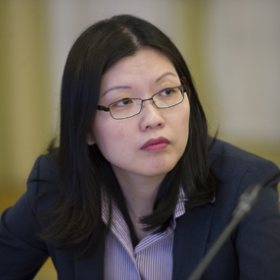
Discreet Communication to Bolster U.S.-China Relations
More discreet communication and non-official forms of candid exchange would bolster relations between the United States and China, suggests Wang Jiarui, Minister of the International Department of the Central Committee of the Communist Party of China (IDCPC).
Wang spoke at the EastWest Institute (EWI) on December 8, 2010, to an audience that included EWI Co-Chairman Ross Perot, Jr. (who chaired the event); Edward Cox, Chairman of the New York Republican State Committee; Maurice Greenberg, Chairman and CEO of C.V. Starr & Co., Inc.; Winston Lord, former U.S. Ambassador to China; and Frank G. Wisner, Jr., International Affairs Advisor at Patton Boggs LLP.
Wang shared his first-hand impressions of the United States and China’s approach to addressing various global challenges. In his speech, Wang endorsed a piece of advice given to him by Henry Kissinger, a former U.S. Secretary of State and National Security Advisor who helped normalize relations between the U.S. and China in the 1970s. Kissinger had suggested that the two countries find solutions to differences in private rather than present the contents of all conversations publicly to the media.
Wang emphasized the value of this kind of discreet communication in approaching the North Korean leadership, particularly during the current crisis on the peninsula. Regarding U.S. calls for China to take more forceful action against North Korea, he noted that his country does not publicize all that it does. Therefore, simply because China has not announced that it is conducting quiet diplomacy does not mean that it is not doing so.
Wang also suggested more candid exchanges between the United States and China, similar to the 2nd U.S.-China High-Level Political Party Leaders Dialogue recently convened in Washington, D.C. Lauding the dialogue as an important new platform for promoting relations between the two countries, he proposed the possibility of organizing additional dialogues between various groups, such as businessmen or youth. Citing interest by Ohio political leaders in attracting Chinese businesses to their state, Wang stressed, for example, the constructive role that a dialogue between Chinese and U.S. businessmen could play.
This speech came at the end of a nine-day, four-city visit of the United States by a 22-member Communist Party of China (CPC) delegation led by Wang.
Following the dialogue sessions in Washington, D.C. with Democratic and Republican leaders, the CPC delegation visited Chicago, Illinois, and Columbus, Ohio, before concluding their trip in New York City. In Chicago and Columbus, the delegation had meetings with a number of prominent local Republicans and Democrats (including Illinois Governor Pat Quinn, Chicago Mayor Richard Daley, Ohio Governor Ted Strickland, and Ohio Governor-Elect John Kasich), members of the Midwest U.S.-China Association, leading Ohio businessmen, and The Ohio State University President Gordon Gee. In New York, the delegation also met with Dr. Henry Kissinger.

